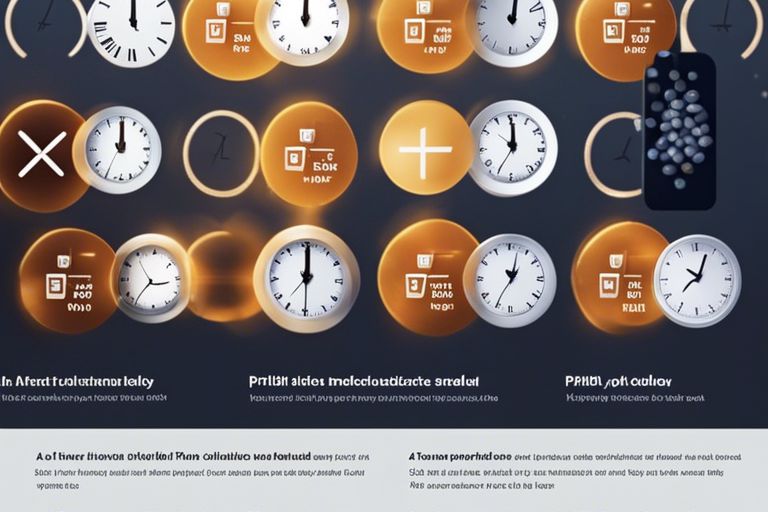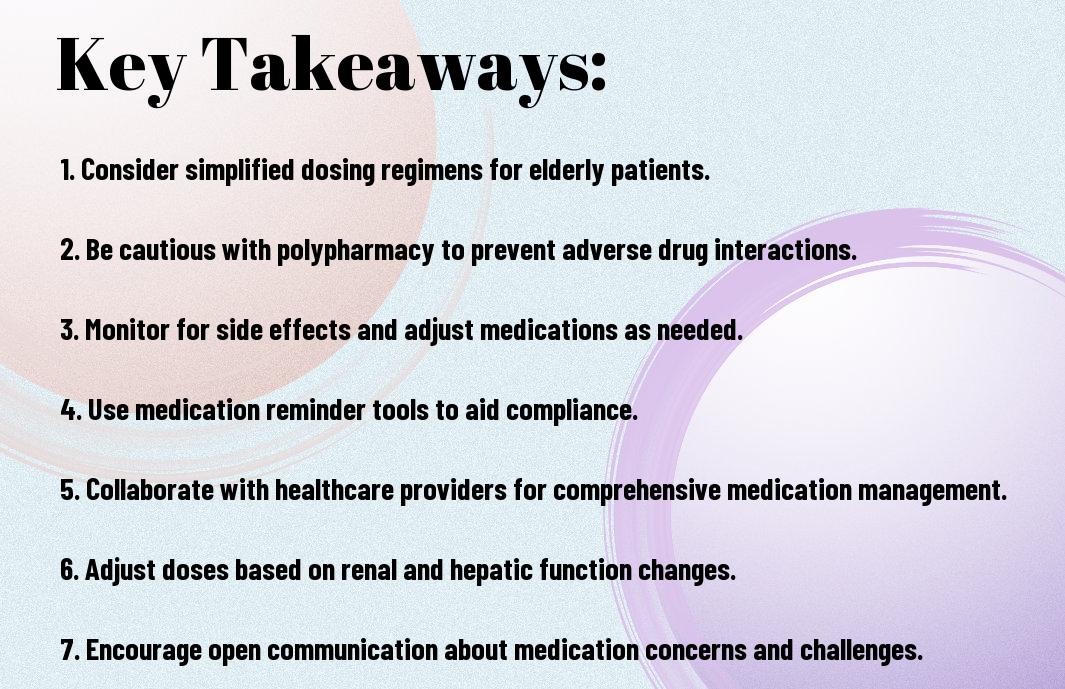
Many elderly individuals juggle multiple medications daily, making it crucial to establish an optimal medication schedule for their well-being. In this guide inspired by the wisdom of Dr. Atul Gawande, we will explore 7 key tips to help streamline and improve medication management for the elderly. By implementing these strategies, caregivers and seniors can navigate the complexities of medication adherence with clarity and compassion.

Key Takeaways:
- Regular Medication Review: Conduct regular medication reviews with healthcare providers to optimize the medication schedule for elderly patients.
- Simplify Medication Regimen: Simplify the medication regimen by consolidating doses and using tools like pill organizers to prevent missed doses and confusion.
- Consider Individual Needs: Tailor medication schedules to the individual needs and preferences of elderly patients to ensure adherence and effectiveness.


Assessing Medication Needs
Identifying Essential Medications
For elderly individuals, identifying vital medications is crucial in creating an optimal medication schedule. These are medications that are necessary for managing chronic conditions, preventing serious health complications, or improving overall quality of life. To determine vital medications, it is important to consult with healthcare providers and pharmacists to prioritize the most critical drugs.
Considering Health Conditions and Interactions
The consideration of health conditions and potential drug interactions is paramount when assessing medication needs for the elderly. The interaction between medications can have serious consequences, including adverse side effects or reduced efficacy of the drugs. Additionally, certain health conditions may require specific medications or dosage adjustments to ensure optimal outcomes. It is vital to have a comprehensive understanding of the individual’s health profile to make informed decisions about their medication regimen.
When considering health conditions, it is important to take into account the complex nature of geriatric health and how certain conditions may impact the effectiveness of medications. Some health conditions may require specialized medications or monitoring to avoid potential complications.
Simplifying the Medication Regimen
Some elderly individuals may find it challenging to manage multiple medications at different times throughout the day. Simplifying the medication regimen can help reduce confusion and improve medication adherence. Here are some strategies to simplify a complex medication schedule for the elderly.
Reducing Polypharmacy Risks
The overuse of medications, known as polypharmacy, can increase the risk of adverse drug reactions and drug interactions in the elderly. To reduce these risks, healthcare providers should regularly review all medications that the elderly individual is taking and eliminate any unnecessary or duplicate medications. Streamlining the medication regimen can help prevent potential side effects and complications associated with polypharmacy.
Consolidating Medications to Once-Daily Doses
The act of consolidating medications to once-daily doses can help simplify the medication schedule for the elderly. Combining multiple medications into one dose can make it easier for the individual to remember to take their medications and reduce the chances of missing a dose. This approach can also help improve medication adherence and overall health outcomes for elderly patients.
For instance, if an elderly individual is taking multiple medications throughout the day, their healthcare provider may adjust the dosing schedule to consolidate some medications into once-daily doses. This strategy can help reduce pill burden and make it easier for the individual to stay on track with their medication regimen.
Timing Medications for Maximum Effect
To ensure the optimal effectiveness of medications for the elderly, timing plays a crucial role. By carefully planning the timing of medications, you can enhance their efficacy and minimize side effects. Here are some key tips to consider.
Synchronizing with Daily Routines
Medications should be scheduled to align with the elderly individual’s daily routines. By integrating medication intake with meals or specific activities, it becomes easier to remember and adhere to the prescribed schedule. Setting alarms or using pill organizers can also help in maintaining consistency.
Avoiding Peak Side-Effect Hours
Avoiding administering medications during peak side-effect hours can significantly improve the quality of life for the elderly. Some medications may cause drowsiness or digestive issues, which can be more pronounced during certain times of the day. Consulting with healthcare providers to adjust the timing of these medications can help minimize these undesirable effects.
Effect By strategically timing medications, you can maximize their benefits while reducing the likelihood of adverse reactions. This proactive approach can lead to better treatment outcomes and improved overall well-being for elderly individuals.
Minimizing Medication Errors
Despite the best intentions, medication errors can occur, especially among the elderly population who may be managing multiple prescriptions. It is crucial to take proactive steps to minimize these errors and ensure the safety and well-being of seniors. One helpful resource is How to Help Seniors Manage Their Medications, which provides valuable tips and strategies.
Using Pill Boxes and Reminders
Pill boxes are a simple yet effective tool for organizing medications. By sorting pills into designated compartments for each day of the week, seniors can easily track which doses they have taken and which ones are still pending. Pairing pill boxes with reminders such as alarm clocks or smartphone alerts can further enhance medication adherence.
Involving Caregivers and Family Members
Boxes may benefit from involving caregivers and family members in the medication management process. Loved ones can help double-check that the correct medications are being taken at the right times. Additionally, they can provide support and encouragement to ensure consistency in following the prescribed medication schedule.
Using a team approach involving caregivers and family members can offer an extra layer of safety and accountability, reducing the risk of medication errors and promoting better health outcomes for seniors.
Monitoring Medication Adherence
Now, when it comes to ensuring that your elderly loved ones are taking their medications as prescribed, monitoring medication adherence is crucial. One effective way to do this is by creating a medication calendar.
Creating a Medication Calendar
For elderly individuals with multiple medications, a medication calendar can help track which medications need to be taken at specific times. This can be a physical calendar displayed prominently in their living space or a digital calendar set up with reminders on their phone or computer. By having a visual aid that outlines when each medication should be taken, it can help prevent missed doses and confusion.
Regularly Reviewing Medication Lists
With regular medication list reviews, you can ensure that your loved ones are not only taking their medications as prescribed but also that they are up to date with any changes in their medication regimen. Set aside time every few months to go over the list of medications with their healthcare provider. This can help catch any potential drug interactions, duplicate medications, or outdated prescriptions that may be harmful or no longer necessary.
Medication reconciliation is a critical step in ensuring the safety and effectiveness of the medications being taken by elderly individuals. It is also an opportunity to discuss any side effects or concerns they may have about their current medications.
Managing Medication Side Effects
For elderly individuals, managing medication side effects is crucial to ensure optimal health and well-being. Side effects can range from mild discomfort to severe reactions that may require medical attention. It is vital to be proactive in recognizing and addressing any adverse effects that may arise.
Recognizing Early Warning Signs
On the medication schedule for elderly individuals, it’s important to pay close attention to any changes in their physical or mental well-being. Early warning signs of medication side effects may include nausea, dizziness, fatigue, confusion, or changes in appetite. Monitoring these symptoms regularly can help healthcare providers intervene early to prevent any serious complications.
Adjusting Doses or Switching Medications
Side effects from medications can sometimes be managed by adjusting the dosage or switching to a different medication. It is important to consult with a healthcare provider before making any changes to the medication regimen. Some side effects may indicate a need for immediate adjustment or cessation of a medication to prevent harm to the individual’s health.
Early identification and proactive management of medication side effects are vital for the well-being of elderly individuals. By recognizing warning signs early and consulting healthcare providers for necessary adjustments, the medication schedule can be optimized to promote health and quality of life.
Conclusion
From above descriptions, it is clear that creating an optimal medication schedule for elderly individuals is a crucial aspect of their overall health and well-being. By following the 7 key tips outlined in this article, caregivers and healthcare professionals can ensure that medications are taken safely and effectively, minimizing the risk of adverse effects and drug interactions.
It is imperative to prioritize communication, organization, and routine in managing medication schedules for the elderly. By implementing these tips and being vigilant about any changes in their health, caregivers can help older adults maintain their independence and quality of life while managing their medications effectively.
FAQ
Q: Why is it important to have an optimal medication schedule for elderly individuals?
A: Having an optimal medication schedule for elderly individuals is crucial to ensure their health and well-being. It helps prevent medication errors, adverse drug reactions, and missed doses, ultimately leading to better management of their overall health conditions.
Q: How can a complicated medication regimen affect elderly individuals?
A: Complicated medication regimens can be overwhelming for elderly individuals, leading to confusion, missed doses, and potential interactions between different medications. It can also increase the risk of medication-related issues and hospitalizations.
Q: What are some common challenges faced by elderly individuals when it comes to medication management?
A: Common challenges include memory issues, difficulty reading small labels, physical limitations that make it hard to open bottles, and financial constraints that may lead to medication non-adherence.
Q: How can caregivers help elderly individuals in managing their medication schedules?
A: Caregivers can assist by organizing medications in pill organizers, setting up reminders, keeping track of refills, and communicating with healthcare providers about any concerns or changes in the individual’s condition.
Q: What are some tips for creating an optimal medication schedule for elderly individuals?
A: Some key tips include organizing medications in a weekly pill organizer, creating a medication list with dosages and timings, setting up reminders using alarms or phone apps, and conducting regular medication reviews with healthcare providers.
Q: How can healthcare providers support elderly patients in managing their medication schedules?
A: Healthcare providers can support elderly patients by simplifying medication regimens, providing easy-to-read instructions, coordinating care between different specialists, and conducting regular medication reconciliation to prevent any adverse drug interactions.
Q: What are the potential risks of not following an optimal medication schedule for elderly individuals?
A: Not following an optimal medication schedule can lead to medication errors, missed doses, drug interactions, worsening health conditions, hospitalizations, and decreased quality of life for elderly individuals.


No Comments